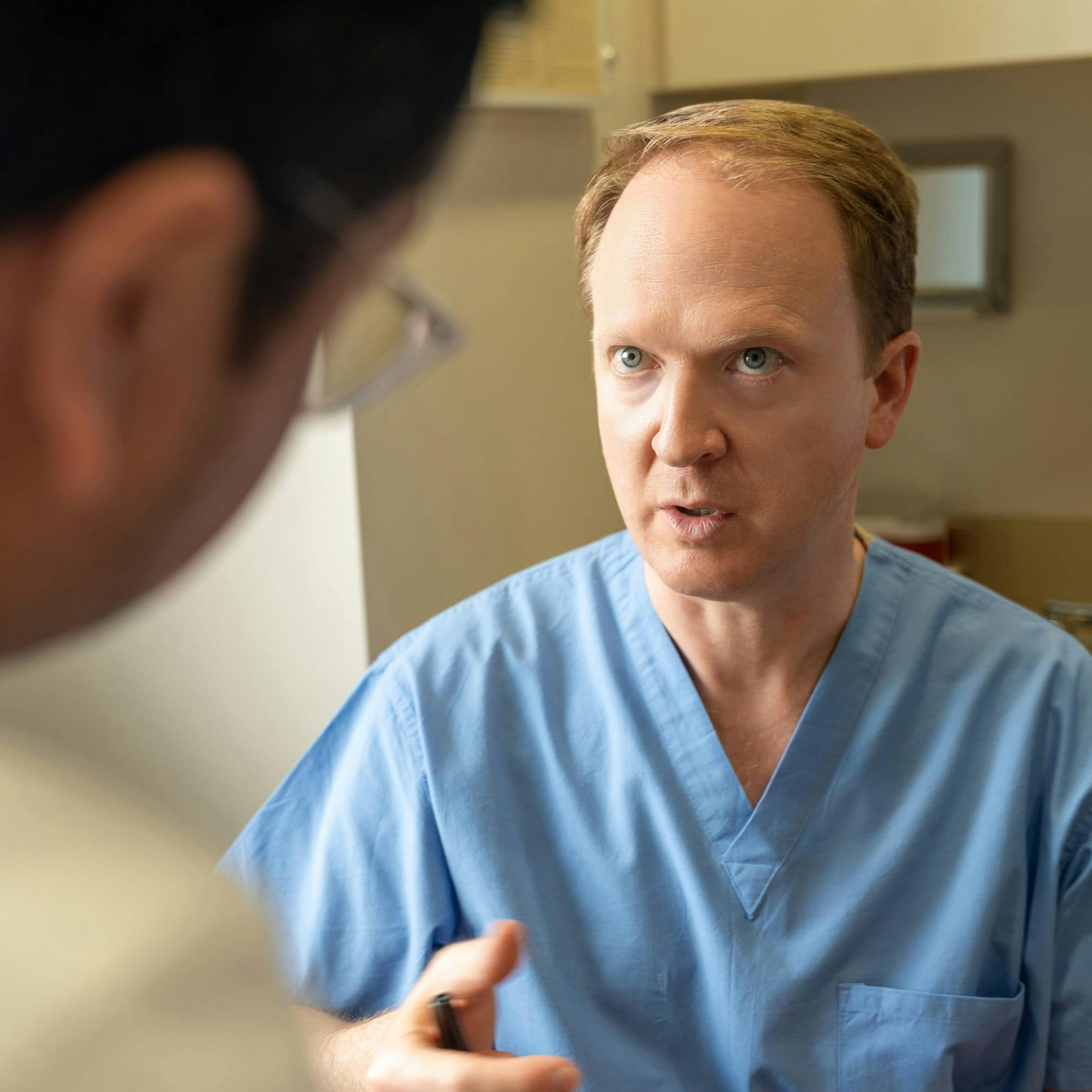Radiculopathy, often characterized by pain, weakness, or numbness radiating along a nerve pathway, can affect your daily life. This condition is commonly known as a “pinched nerve.”
Radiculopathy in Arlington, VA


What Causes Radiculopathy?
Radiculopathy is commonly caused by compression or irritation of spinal nerve roots. When a nerve is irritated or under pressure, it sends signals to the brain, causing various symptoms. Common sources of radiculopathy causing symptoms include:
Herniated Discs:
Protrusion of the soft inner part of a spinal disc can compress adjacent nerve roots, causing symptoms.
Spinal Stenosis:
Narrowing parts of the spine where nerves are located can lead to pressure on nerves.
Degenerative Disc Disease:
Wear-and-tear on spinal discs can contribute to the development of radiculopathy by causing disc slippages or decreased space within the neural foramen.
Nerve Irritation:
Irritation of the nerves from inflammation may lead to pain, tingling, and weakness along the nerve pathway.
Symptoms of Radiculopathy
The symptoms of radiculopathy depend on what part of the spine is affected and can include:
Cervical Region:
- Pain radiating into the shoulders, arms, or hands.
- Numbness or tingling in the arms.
- Muscle weakness in the arms.
- Dexterity problems in the hand.
- Altered reflexes.
Thoracic Region:
- Pain extending to the chest or abdomen.
- Weakness in the muscles of the upper back.
- Numbness or tingling in the torso.
Lumbar Region:
- Pain traveling into the buttocks or legs.
- Weakness in the muscles of the lower back and legs.
- Numbness or tingling in the legs, feet, or genitalia.
- Difficulties with bowel or bladder function.


Why Choose Virginia Neurosurgeons for Radiculopathy Care?
At Virginia Neurosurgeons, our board-certified neurosurgeons have extensive training in the diagnosis and surgical management of spinal conditions. What sets Virginia Neurosurgeons apart from other spinal surgeons is our comprehensive training as neurosurgeons. We approach each case by integrating the patient’s symptoms, imaging findings and diagnostics, and detailed neurologic assessment to diagnose the patient and formulate a personalized treatment plan. We pride ourselves on ethical and honest practices, serving as trusted advocates and partners for our patients’ medical care. Our commitment to open communication ensures that patients fully understand their conditions and treatment options, even if they are not surgical candidates. Our surgical interventions aim to provide clinically meaningful benefits, including pain reduction and preservation and restoration of neurological function, improving the quality of life for our patients.
How is Radiculopathy Diagnosed?
At Virginia Neurosurgeons, our board-certified neurosurgeons adopt a comprehensive approach to understanding the specific factors contributing to your condition. By combining state-of-the-art diagnostic tools, Virginia Neurosurgeons ensures a precise understanding of the radiculopathy condition, enabling the development of personalized and effective treatment strategies for each patient. Our expert team follows a meticulous process to procure evidence of exactly what is occurring:
Medical History:
Our surgeons will review your symptoms and medical history to help you understand and identify sources of pain and neurologic symptoms.
Physical Examination:
Conducting a detailed physical examination allows our neurosurgeons to assess reflexes, muscle strength, and sensory function, aiding in pinpointing affected nerve pathways.
Imaging Studies:
Advanced imaging techniques, such as MRI or CT scans, are employed to visualize the spine and identify structural abnormalities, including herniated discs or spinal stenosis.
Electrodiagnostic Tests:
Nerve conduction studies and electromyography (EMG) help evaluate the electrical activity of muscles and nerves, aiding in the localization of nerve compression.
Diagnostic Injections:
Targeted injections, such as epidural steroid injections, can help confirm the source of pain and further guide the treatment plan.
Treatment Procedures for Radiculopathy
Once our surgeons have diagnosed radiculopathy and identified the underlying cause, they will review non-surgical and surgical treatment options with you to create a management plan specific to your case. Treatments for radiculopathy include:
Non-Invasive Interventions:
- Medications for pain management and inflammation.
- Physical therapy to improve strength and flexibility.
- Activity modification to reduce strain on the spine.
- Acupuncture or dry needling.
- Chiropractic care.
Minimally Invasive Procedures:
- Epidural steroid injections to alleviate pain in the nerves and spinal joints.
- Radiofrequency ablation (specialized heat treatment) to disrupt nerve signals causing pain.
Surgical Interventions:
- Discectomy (disc surgery) to remove disc material pressing on nerves.
- Laminectomy to relieve pressure on spinal nerves.
- Spinal fusion stabilizes the spine and relieves pressure on nerves.
- Artificial disc replacement to maintain spinal motion.
Comprehensive Rehabilitation Programs:
- Customized exercise regimens for ongoing strength and flexibility.
- Lifestyle modifications for long-term spine health.
- Patient education to promote self-management and prevent future issues.
Many patients will benefit from non-surgical therapies. Patients who do not respond to conservative therapy may be surgical candidates. Not all patients with degenerative disc disease may benefit from surgery, however. At Virginia Neurosurgeons, we will provide you with our honest recommendation on the most effective treatment for your condition, even if it is not surgical.


Schedule Your Radiculopathy Consultation with Virginia Neurosurgeons Today
Experience relief from radiculopathy symptoms—schedule a consultation with Virginia Neurosurgeons today. Our expert team offers personalized care and effective interventions tailored to your needs. Take the first step toward improved spinal health and enhanced well-being.
